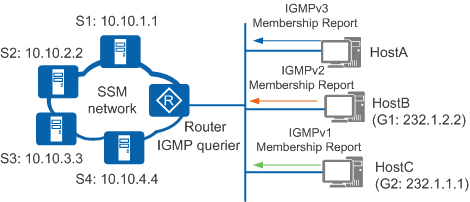IGMP SSM Mapping
Source-specific multicast (SSM) requires multicast routers to know which multicast sources hosts specify when they join a multicast group. A host running IGMPv3 can specify multicast source addresses in IGMPv3 Report messages. However, hosts running IGMPv1 or IGMPv2 rely on the IGMP SSM mapping function to obtain the SSM service.
IGMP SSM mapping is implemented based on static SSM mapping entries. A multicast router converts (*, G) information in IGMPv1 and IGMPv2 Report messages to (G, INCLUDE, (S1, S2...)) information according to static SSM mapping entries to provide the SSM service for IGMPv1 and IGMPv2 hosts.
- If G is in the any-source multicast (ASM) group address range, the router provides the ASM service for the host.
- If G is in the SSM group address range (232.0.0.0 to 232.255.255.255 by default):
- When the IGMP querier has no SSM mapping entry matching G, it does not provide the SSM service and drops the Report message.
- If the IGMP querier has an SSM mapping entry matching G, it converts (*, G) information in the Report message into (G, INCLUDE, (S1, S2...)) information and provides the SSM service for the host.
The following table lists the SSM mapping entries configured on the router.
Group Address |
Multicast Source Address |
|---|---|
232.0.0.0/8 |
10.10.1.1 |
232.1.0.0/16 |
10.10.2.2 |
232.1.0.0/16 |
10.10.3.3 |
232.1.1.0/24 |
10.10.4.4 |
When the router receives Report messages from HostB and HostC, it checks whether the group addresses in the messages are in the SSM group address range. If so, the router generates (S, G) entries based on the SSM mappings. If a group address is mapped to multiple sources, the router generates multiple (S, G) entries.
The router generates an (S, G) entry based on each SSM mapping entry matching a group address. Therefore, the router generates four (S, G) entries for 232.1.1.1, and three (S, G) entries for 232.1.2.2.
Group Address in IGMPv1/IGMPv2 Report |
Generated Multicast Forwarding Entry |
|---|---|
232.1.1.1 (from HostC) |
(10.10.1.1, 232.1.1.1) (10.10.2.2, 232.1.1.1) (10.10.3.3, 232.1.1.1) (10.10.4.4, 232.1.1.1) |
232.1.2.2 (from HostB) |
(10.10.1.1, 232.1.2.2) (10.10.2.2, 232.1.2.2) (10.10.3.3, 232.1.2.2) |

IGMP SSM mapping does not apply to IGMPv3 Report messages. To enable hosts running any IGMP version on a network segment to obtain the SSM service, IGMPv3 must run on interfaces of multicast routers on the network segment.
